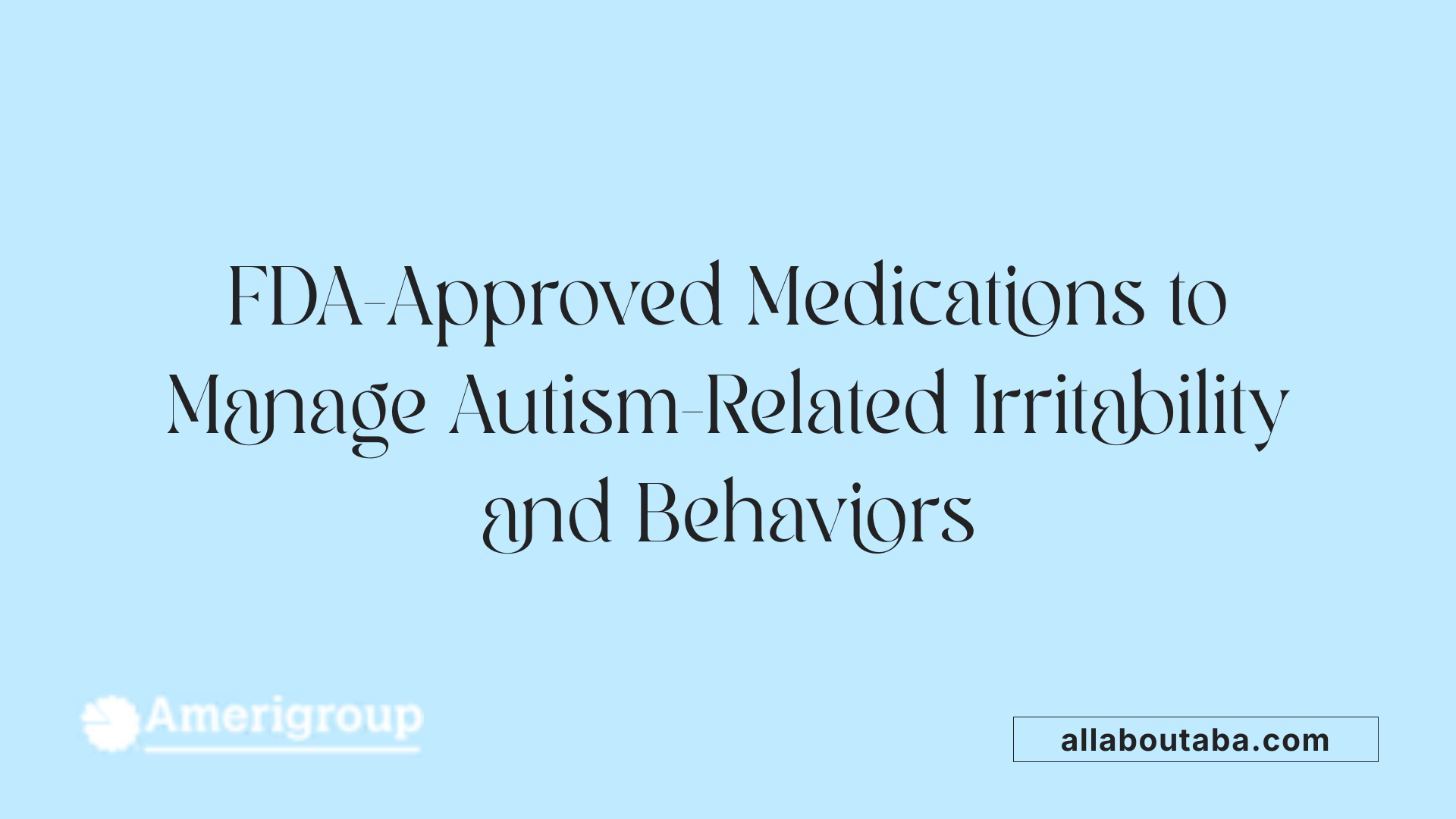An Overview of Medication Use in Autism Spectrum Disorder
While there is currently no cure for autism spectrum disorder (ASD), a variety of medications can be employed to manage associated symptoms and improve quality of life. In conjunction with behavioral and developmental therapies, pharmacological treatments play a vital role in comprehensive ASD management. This article explores the available medications, their effects, safety considerations, and how they fit into broader treatment strategies.
Diverse Treatment Strategies for Autism

What treatment options are available for autism, including medications and therapies?
Currently, there is no cure for autism spectrum disorder (ASD). However, a variety of treatments can support individuals across different age groups and help improve their quality of life. These treatments primarily aim to reduce symptoms that interfere with daily functioning and enhance skills.
Behavioral therapies are regarded as the most effective and well-supported approaches. Applied Behavior Analysis (ABA) is widely used and developed to promote desired behaviors while discouraging undesired ones. ABA includes specific methods such as discrete trial training (DTT) and pivotal response training (PRT). These approaches help children develop communication and social skills.
Speech therapy and occupational therapy are also common. Speech therapy focuses on improving language and communication abilities, while occupational therapy supports daily living skills and sensory integration. Developmental therapies that target language development and physical skills are crucial early on, especially during preschool years.
Educational approaches like TEACCH create structured classroom environments emphasizing visual learning and routines. Social skills training, including social stories and group activities, helps improve interpersonal interactions.
In addition to therapies, treatments involve managing co-occurring conditions such as anxiety, hyperactivity, seizures, and sleep disturbances. Medications are used to support these aspects. For instance, medications like risperidone and aripiprazole are FDA-approved for reducing irritability and aggression in children with ASD.
Other pharmacological options include SSRIs like fluoxetine, which help with anxiety and depression, and stimulants like methylphenidate used for ADHD symptoms. Sleep issues might be addressed with melatonin, while pain, infections, or allergies are treated with suitable medications such as analgesics, antibiotics, or antihistamines.
A tailored combination of therapies and medications, designed around the individual’s specific needs, leads to the most effective outcomes. Collaboration with healthcare professionals ensures that each treatment plan is safe and appropriate.
Is medication effective in treating autism overall?
While medications cannot cure autism spectrum disorder or directly treat its core features, they can significantly help manage associated symptoms. Autism's main symptoms—like communication challenges, social difficulties, and repetitive behaviors—are not alleviated by medication.
However, certain drugs are approved to address specific co-occurring issues. Risperidone and aripiprazole are FDA-approved for reducing irritability, aggression, tantrums, and self-injury in children with ASD. These medications have shown clinically meaningful improvements by decreasing stress-related behaviors.
Medications such as SSRIs (e.g., fluoxetine) are prescribed off-label to address anxiety and social withdrawal. Stimulants like methylphenidate can improve hyperactivity and impulsivity, particularly when ADHD symptoms coexist.
Moreover, some drugs like naltrexone have been used to reduce repetitive and self-injurious behaviors, although they are not officially approved for autism. Melatonin is commonly employed to improve sleep patterns.
It must be emphasized that medications only support symptom management rather than targeting the core neurological and developmental aspects of autism. They are most effective when combined with behavioral interventions.
Treatment with medication should be carefully supervised, considering potential side effects and individual responses. Healthcare providers typically monitor progress and adjust dosages to optimize benefits and minimize risks.
In conclusion, medication plays a supportive role in a comprehensive treatment plan. It helps improve specific behavioral and emotional challenges but does not replace behavioral, speech, or educational therapies.
| Treatment Modality | Examples | Purpose | Notes |
|---|---|---|---|
| Behavioral Therapies | ABA, DIR/Floortime, TEACCH | Develop communication, social, and adaptive skills | Foundation of effective ASD support |
| Communication Therapies | Speech therapy, PECS | Enhance language and expressive skills | Often combined with behavioral methods |
| Developmental Therapies | Language, physical, occupational | Promote overall developmental gains | Focus on early intervention |
| Pharmacological Treatments | Risperidone, aripiprazole, SSRIs, stimulants, melatonin | Manage co-occurring symptoms | Used in conjunction with therapies |
Understanding the full spectrum of treatment options allows for better planning and support tailored to each individual's needs. Ongoing research continues to explore new medications and therapies to improve outcomes for those with autism.
Medications Approved for Autism-Related Irritability

What are the medications used to treat autism and their effects?
Medications for autism focus on alleviating specific symptoms such as irritability, hyperactivity, anxiety, and seizures. The most notable are two FDA-approved drugs: risperidone and aripiprazole. These medications, classified as atypical antipsychotics, are primarily used to reduce irritability and severe behavioral issues in children with autism.
Risperidone has shown in clinical trials to significantly improve symptoms like irritability, tantrums, aggression, and self-injurious behaviors. Aripiprazole also reports benefits in decreasing irritability and hyperactivity, as well as stereotypical behaviors.
While effective for certain symptoms, these medications may cause side effects such as weight gain, movement disorders (like tremors or stiffness), hormonal changes, and metabolic issues. Therefore, their use must be carefully managed by healthcare providers.
Beyond these FDA-approved options, a variety of medications can be included in comprehensive treatment plans. SSRIs like fluoxetine or sertraline are employed to manage anxiety and repetitive behaviors owing to their antidepressant effects. Stimulants such as methylphenidate are prescribed to address hyperactivity and focus difficulties.
Anti-anxiety medications and anticonvulsants also contribute to controlling associated symptoms. However, these drugs do not target the core features of autism—such as social challenges and communication difficulties—and should be used alongside behavioral therapies and supportive interventions.
Overall, medication management is most effective when integrated into a broad, individualized treatment strategy emphasizing continuous monitoring, side effect management, and consistent communication with healthcare providers. Medications are instrumental in improving quality of life but are not a cure for autism.
What are common medications prescribed for autism?
The most common and well-supported medications for managing autism symptoms include:
| Medication | Purpose | Effects | Side Effects |
|---|---|---|---|
| Risperidone | Reduce irritability & aggression | Decreases tantrums, self-injury, and agitation | Weight gain, drowsiness, hormonal effects |
| Aripiprazole | Decrease irritability & hyperactivity | Improves conduct, reduces temper outbursts | Weight gain, sleep issues, movement disorders |
| SSRIs (like fluoxetine, sertraline, citalopram) | Manage anxiety & repetitive behaviors | Improves mood & social engagement | Gastrointestinal issues, sleep disturbances, agitation |
| Methylphenidate | Control hyperactivity & attention issues | Enhances focus, reduces impulsivity | Appetite loss, sleep problems, increased heart rate |
| Guanfacine & Clonidine | Hyperactivity & impulsivity | Calms hyperactivity, improves sleep | Drowsiness, dizziness, low blood pressure |
Most other medications, such as anticonvulsants for seizures, naltrexone for repetitive behaviors, and sleep aids like melatonin, are also used based on individual needs. It is vital that healthcare professionals oversee medication plans to maximize benefits and minimize adverse effects.
How do these medications fit into overall treatment?
Medications, while important, are only one part of a comprehensive approach to autism management. Behavioral therapies such as applied behavior analysis (ABA), speech and occupational therapy, and educational interventions play central roles.
Combining medication with these therapies can significantly enhance daily functioning and social skills. For instance, reducing irritability with risperidone or aripiprazole can help children better participate in behavioral therapies and educational activities.
The decision to start, stop, or adjust medication requires careful evaluation of individual responses and side effects. Regular follow-up appointments allow healthcare providers to monitor progress, address concerns, and modify treatment plans as needed.
In summary, while these medications help manage specific problematic behaviors, they do not cure autism. Their proper use, coupled with therapy and educational support, aims to improve quality of life, fostering better social integration and daily functioning.
Limitations and Safety of Autism Medications

What is the safety, efficacy, and limitations of autism medications?
Currently, there are limited medications approved specifically for the core symptoms of autism spectrum disorder (ASD). The only FDA-approved drugs for managing certain symptoms are risperidone and aripiprazole, which are mainly used to reduce irritability, aggression, and self-injurious behaviors in children with ASD.
Aside from these, various other medications like selective serotonin reuptake inhibitors (SSRIs), stimulants, and drugs like oxytocin are employed to target co-occurring conditions such as anxiety, depression, or hyperactivity. However, the evidence supporting their effectiveness varies, and many are prescribed off-label, meaning they are used for purposes other than their original FDA approval.
Medication safety profiles differ significantly. Common side effects include weight gain, sedation, movement issues like tremors or tardive dyskinesia, and hormonal effects. Long-term safety data are often limited, emphasizing the need for careful monitoring.
Most treatments for ASD focus on supporting behavioral, communication, and social skills through therapies like Applied Behavior Analysis (ABA), speech therapy, and occupational therapy. Pharmacological interventions serve as adjuncts to these therapies, aiming to manage specific symptoms rather than treating the disorder itself.
It is crucial for families and healthcare providers to critically evaluate treatment options, favoring scientifically validated medications. Unproven or unsafe interventions claiming to cure or significantly alter ASD should be approached with caution.
Are there limits to what medication can do for autism?
Medications cannot resolve the fundamental core symptoms of autism, such as social communication difficulties, repetitive behaviors, or sensory sensitivities. Their main role is to manage associated behaviors that interfere with daily functioning, like irritability, hyperactivity, and anxiety.
While some medications can bring about significant improvements in specific behaviors, they are not a replacement for behavioral therapies and skill development programs. Each individual responds differently to medication, and side effects can be limiting. Common adverse effects include weight gain, movement disorders, sedation, and hormonal changes.
Because of these limitations, healthcare professionals must monitor treatments closely, adjusting doses and managing side effects diligently. Medication use should always be part of a comprehensive treatment plan that includes behavioral and developmental support.
Overall, medications provide valuable support but do not alter the core features of autism. The goal remains improving quality of life and functioning through combined therapies and careful medication management.
Role of Healthcare Providers and Family in Medication Management
How do medications work in managing autism symptoms?
Medications in managing autism symptoms primarily target associated behaviors and co-occurring conditions rather than the core features of autism itself. For example, antipsychotic medications like risperidone and aripiprazole are FDA-approved to reduce irritability, aggression, and self-injurious behaviors. Additionally, SSRIs can help decrease repetitive behaviors and anxiety, while stimulants may improve focus and hyperactivity. Many medications require careful adjustment and are often used alongside behavioral therapies to achieve the best outcomes. Overall, medication use aims to improve quality of life and functioning, but it does not cure autism.
Medications help manage specific symptoms that interfere with daily life, such as extreme irritability, anxiety, hyperactivity, or sleep disturbances. However, they do not treat the fundamental, core issues of autism, like social communication challenges or repetitive behaviors. Instead, medicines serve as tools to support individuals in functioning better within their environments. This targeted approach is most effective when combined with therapies that develop skills and coping strategies.
How do healthcare providers and families collaborate on medication management?
Effective management of medication in individuals with autism involves close collaboration between healthcare providers and families. Doctors develop personalized treatment plans, carefully considering the individual's unique needs, behaviors, and health profile. Families are educated about the benefits, risks, and potential side effects of medications, enabling informed consent.
Regular monitoring ensures that efficacy is assessed, side effects are managed, and doses are adjusted as necessary. This ongoing process requires open communication, careful observation, and flexibility to refine treatment strategies. Families play a crucial role in monitoring responses and reporting concerns, ensuring that medication use remains as safe and effective as possible.
Structured collaboration ensures that medication is used responsibly, maximizing benefits while minimizing risks. Healthcare providers should explain the purpose of each medication, possible side effects, and what signs to watch for. Families, in turn, provide valuable insights about how their loved ones respond to medication in real-life settings.
Importance of informed consent and understanding risks
Before starting any medication, caregivers and individuals must be fully informed about its purpose, potential benefits, and possible side effects. This process, known as informed consent, is essential to ethical treatment. Understanding the risks helps families make balanced decisions and prepare for managing possible adverse effects.
Medications like risperidone and aripiprazole, while approved for irritability in autism, can have side effects such as weight gain, drowsiness, or movement disorders. Transparent communication enables families to weigh these risks against expected benefits. Healthcare providers should also discuss the importance of monitoring and the potential need to modify or discontinue medications if adverse effects occur.
Ongoing monitoring for side effects and effectiveness
Children and adults on medication require regular check-ins to assess how well the medication is working and whether any side effects are present. Monitoring might include scheduled appointments, behavioral observations, and sometimes blood tests or other health screens.
Adjustments to dosage or medication type are often necessary to optimize safety and effectiveness. For example, a certain dose might reduce irritability without causing excessive sedation or weight gain. Consistent follow-up helps detect problems early, allowing for timely modifications.
Adjusting medication as needed
Flexibility in medication management is vital. As responses to medications vary over time, healthcare providers may need to increase, decrease, or change prescriptions.
Some individuals develop tolerance, meaning the same dose becomes less effective. Others may experience new side effects. Regular evaluation ensures that the treatment plan remains aligned with the individual's evolving needs and health status.
Observation of individual responses and tolerances
Families and healthcare teams should observe changes in behavior, mood, and physical health. Noticing improvements or adverse reactions helps guide medication adjustments.
This ongoing observation provides insights into how well the medication works and whether any side effects warrant changes. Careful documentation can support decisions about continuing, modifying, or stopping a medication.
Educating families about realistic expectations
Families need clear information about what medications can and cannot do. While medicines can help manage symptoms like irritability or hyperactivity, they rarely eliminate these issues entirely.
Setting realistic expectations prevents disappointment and encourages supportive strategies alongside medication. Education also empowers families to participate actively in treatment decisions, monitor responses, and advocate for their loved ones.
Medication management in autism: a collaborative effort
In summary, effective medication management for individuals with autism depends on a cooperative approach involving healthcare providers and families. Developing tailored treatment plans, understanding potential risks, and continuous monitoring are essential to achieving the best possible outcomes.
This teamwork helps ensure medications are used safely and responsibly, supporting individuals with autism to lead more comfortable and fulfilling lives.
The Future of Pharmacological Interventions in Autism
While current medications primarily support management of co-occurring symptoms rather than the core features of autism, ongoing research aims to develop more targeted and effective pharmacological treatments. Advances focus on understanding the underlying neurobiological mechanisms of ASD, with promising studies into novel drugs like oxytocin nasal sprays and glutamatergic agents. Collaboration among researchers, clinicians, and families is essential to ensuring the safety and efficacy of new treatments. Importantly, medications should always be integrated into a comprehensive, individualized approach that includes behavioral therapies, developmental supports, and family involvement. As our understanding of autism deepens, the hope is for more precise and effective medication options that can improve outcomes and quality of life for those on the spectrum.
References
- Medication Treatment for Autism | NICHD
- Medicines for Treating Autism's Core Symptoms
- What Are the Treatments for Autism Spectrum Disorder?
- Autism spectrum disorder - Diagnosis and treatment
- Which medications are commonly prescribed for autistic ...
- Autism Spectrum Disorder: Parents' Medication Guide
- Treatment and Intervention for Autism Spectrum Disorder
- List of 13 Autism Medications Compared
- Pharmacological Therapies for Autism Spectrum Disorder







